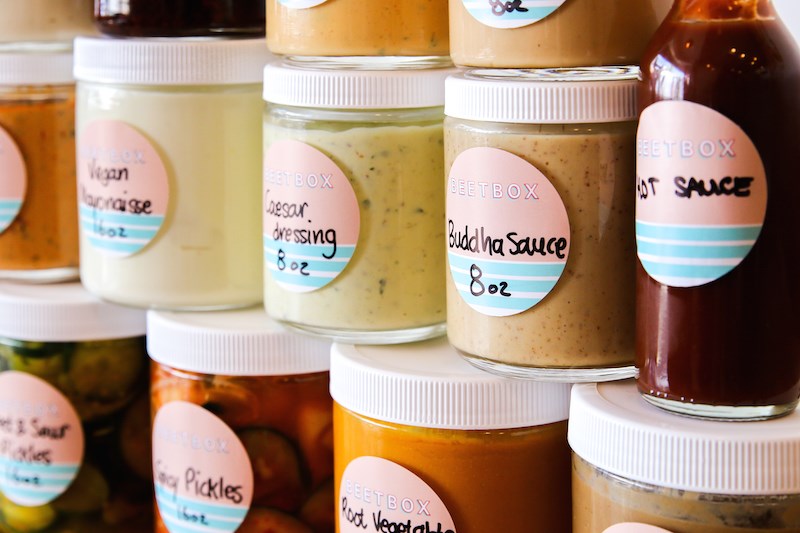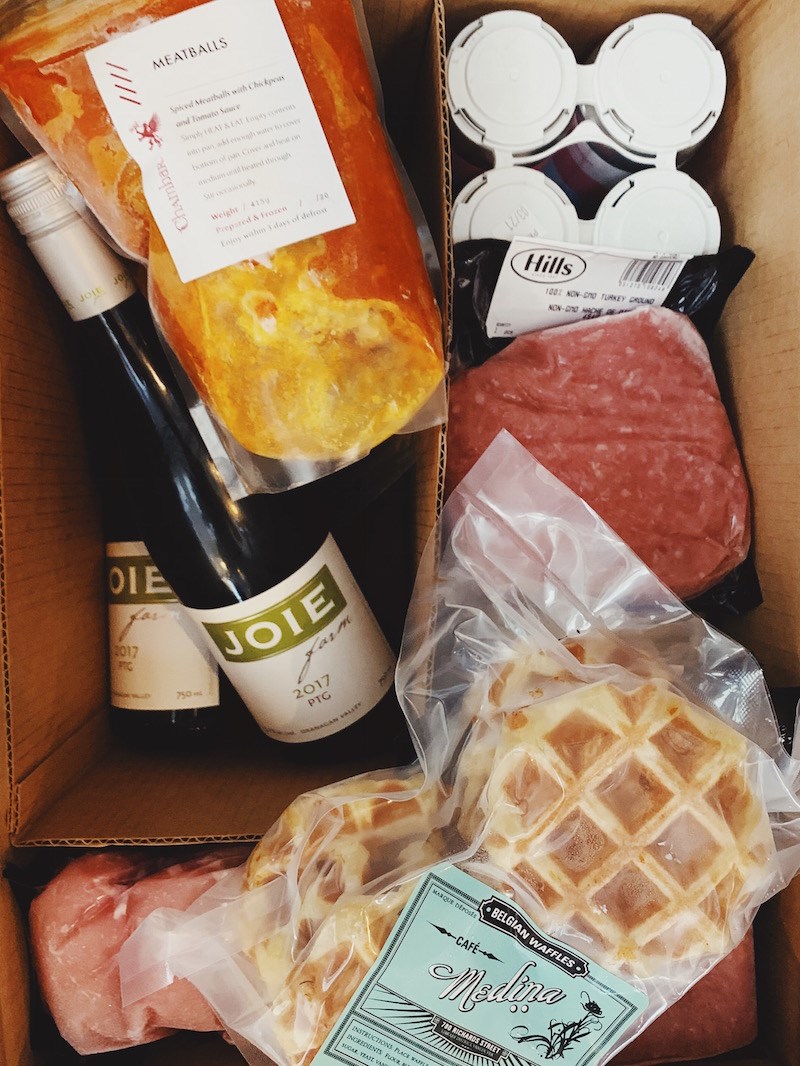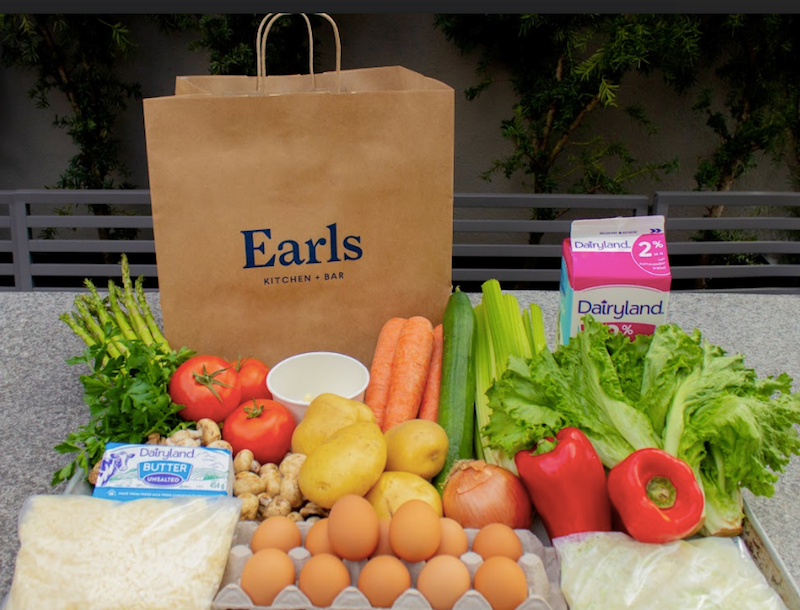"The special today is a Fraser Valley duck breast served with orange sauce, potato puree, and a jar of dry active yeast, one dozen eggs, and a roll of toilet paper."
Odds are, you've never heard that from a server at a Vancouver restaurant, and yet these days, in addition to cooked meals for take-out, businesses across the Metro region have pivoted their model to include groceries, including by delivery.
While a display of some packaged goods, cookbooks, or merch for sale in a restaurant isn't unusual, the current COVID-19 crisis has radically altered our relationship to food.
Grocery stores now have customers in gloves and face masks lining up outside to enter, single direction aisles, and quantity limits on certain items. Popular goods, like canned foods, pasta, flour, and other baking supplies are often sold out. Once you've stood in the taped-off spaced-out line to pay from your side of the protective plastic shield, you get home and follow the steps in online videos for how to "disinfect" your groceries.
And people are cooking and baking more than ever. Jokes about the "COVID 15" weight gain aside, home cooks of all stripes are in the kitchen, feeding themselves, and often their whole families, more meals at home than before the pandemic struck Canada.
Restaurants are among the highest-profile businesses nationwide that are struggling to earn revenue, stay afloat, and stay connected with customers. Operating on typically razor-thin margins, and in Vancouver paying high rent and taxes, there are many restaurants that simply won't be there when the COVID-19 crisis subsides and restrictions on our public movements lessen.
With existing relationships with suppliers, and the know-how to create food items that can be produced and packaged for home consumption, Vancouver restaurants and other food-related businesses are filling the grocery gap.
 Beetbox Basics include the West End plant-based eatery's sauces, dressings, pickles and more. Photo courtesy Beetbox
Beetbox Basics include the West End plant-based eatery's sauces, dressings, pickles and more. Photo courtesy BeetboxVancouver restaurants like Cafe Medina, Boulevard Kitchen & Oyster Bar, and Nuba are among those that now offer groceries, raw ingredients, and packaged goods. The West End's plant-based burger and fries joint Beetbox has just launched a new grocery line of Beetbox Basics that includes dressings, sauces, and pickles, all available to order for pick-up or delivery.
Some restaurants, like Nuba, are even selling one of the most hard-to-find items on most Vancouverites' grocery lists: Toilet paper. Of the two "kits" the Lebanese restaurant with four locations around the city offers, the larger one not includes stews, soups, falafel, lentils, and condiments, but also a dozen eggs, two pounds of potatoes, a pound each of carrots and onions, and two rolls of paper gold - that's the toilet paper.
“We want to help people flatten the curve by letting them order fresh, healthy and nourishing meals as well as items to help them restock their fridge and pantry without having to leave the safety and comfort of their own home," said Nuba's co-owner Ernesto Gomez.
Even larger chains, like JOEY and Earls have launched grocery programs, with extensive options for consumers to pick up or have delivered.
At Earls locations, diners-turned-shoppers can go online and order up meat or vegetable bundles, and things like bottles of sriracha or olive oil, spices, dressings, sauces, butter, eggs, and much more.
“We know of guests who regularly dine in our restaurants struggling to find ingredients on shelves, and others who simply wish to stay home to limit their social interactions. We also recognize our tremendous responsibility to keep our supply chains moving and our people employed. Earls Grocery helps to ensure our farmers, our kitchens, our customers, and our people stay fed and supported during these extraordinary times," said Kristin Vekteris, Chief Brand Officer.
When it comes to suppliers, instead of just reaching restaurant customers, one Vancouver company has broadened their scope significantly. Legends Haul is the distribution company owned and operated by Jillian and Craig Sheridan, the founders of Eastwood Cycle. While the used to "haul" food from farms and vendors to restaurants like Chambar and Kiss Tanto, now they not only sell heat-and-serve packaged foods from those restaurants but also a ever-expanding array of groceries.
 Legends Haul, previously a distribution service for restaurants, is now delivering groceries and packaged food from restaurants, all through Metro Vancouver. Photo courtesy Legends Haul
Legends Haul, previously a distribution service for restaurants, is now delivering groceries and packaged food from restaurants, all through Metro Vancouver. Photo courtesy Legends Haul"As the food distribution company for Vancouver’s top restaurants, it was an easy decision to pivot our business model to offer home grocery delivery services, as we already had the essential building blocks to do so. We saw it as a way to make a positive impact and keep our team employed, while also supporting local farms and restaurants," explained Jillian Sheridan.
"We have received an overwhelming amount of support from restaurants, farmers, and the community," added Sheridan. "We’re proud to be able to make a difference for restaurants and farming partners who may be struggling during this uncertain time, and provide people with the ability to support their favourite local establishments."
In fact, said Sheridan, the service - which serves Metro Vancouver and Squamish via delivery - has proven so popular that Legends Haul plans to continue what they are doing after the COVID-19 crisis has subsided.
The expanded service model is also what you'll find at places like The Federal Store, who are taking online orders for fulfillment for items from their expanded stock line, along with housemade baked goods. You can order up anything from a fresh whole cake to gluten-free waffle mix from local maker NextJen, or frozen dumplings from Vancouver's Dumpling King, or cans of beans, wedges of cheese, or locally produced condiments and snacks.
Local producers are also finding ways to move their products through less traditional methods. Vancouver's Coho Commissary, which is home to a number of local producers, is now offering grocery service, featuring their members' goods. The public can shop their online marketplace to purchase things like Salty Cabbage's kimchi, Tality kombucha, or Bite Snacks' bars and protein powders - made with cricket flour.
Coho's co-founder Andrew Barnes explained: “This is our way of celebrating the hard work and the hustle of our members, so they can not only survive these uncertain times, but thrive."



